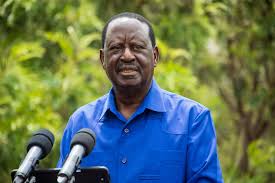 Orange Democratic Movement (ODM) leader Raila Odinga/FILE
Orange Democratic Movement (ODM) leader Raila Odinga/FILE
Speaking to the press on Sunday, Raila called on Kenyans to gather at Kamukunji to honour the spirit of the pro-democracy movement that began on July 7, 1990.
He emphasized that many of the injustices that sparked the original protests, including police brutality, economic inequality and human rights violations, remain unresolved.
“We have not achieved what Saba Saba intended,” Raila said.
“Violation of human rights is still a challenge in the country, police brutality is there and the economy has not performed as we expected.”
The ODM leader said he will personally be at Kamukunji, the same grounds where pro-democracy activists gathered 35 years ago to demand multiparty democracy.
The Saba Saba movement, which refers to July 7 in Kiswahili, holds significant historical weight in Kenya.
It marked the beginning of the end of the single-party rule under President Daniel Arap Moi and led to constitutional reforms and the legalisation of multiparty politics.
Today’s gathering will also serve as a remembrance of those who lost their lives in the 1990 protests.
“I will be attending the Saba Saba at Kamukunji to remember those who were killed,” Raila stated.
Many schools in urban centers have opted to remain closed out of caution, citing potential unrest based on recent demonstrations, which were marred by violence, looting and heavy police response.
Nonetheless, Raila is set to return to Kamukunji, the
birthplace of Kenya’s multiparty democracy struggle and lead the commemoration.
Early in the morning, anti-riot police braced a morning breeze to mount roadblocks on major routes into the Nairobi Central Business District for major searches ahead of planned Saba Saba celebrations.
This was despite the government insisting July 7 would be a normal working day, roadblocks stopped both private and public service vehicles from accessing the city centre.
This was in fear those planning protests would disguise and surprise security agencies in the city centre.











